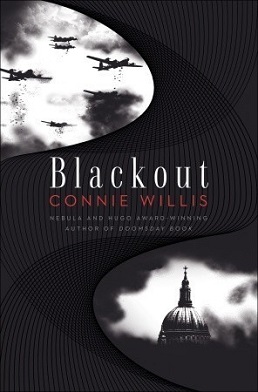All Clear

Blackout first edition hardcover
|
|
| Author | Connie Willis |
|---|---|
| Country | United States |
| Language | English |
| Genre | Science fiction novel |
| Publisher | Spectra |
|
Publication date
|
February 2, 2010 |
| Media type | Print (hardcover) |
| Pages |
Blackout – 512 pages All Clear – 656 pages |
| Awards | Locus Award for Best Science Fiction Novel (2011) |
| ISBN | (Blackout) (All Clear) |
Blackout and All Clear are the two volumes that comprise a 2010 science fiction novel by American author Connie Willis. Blackout was published February 2, 2010 by Spectra. The second part, the conclusion All Clear, was released as a separate book on October 19, 2010. The diptych won the 2010 Nebula Award for Best Novel, the 2011 Locus Award for Best Science Fiction Novel, and the 2011 Hugo Award for Best Novel. These two volumes are the most recent of four books and a short story that Willis has written involving time travel from Oxford during the mid 21st century.
Willis imagines a near future (first introduced in her 1982 story "Fire Watch" and featured in two of her previous novels: Doomsday Book and To Say Nothing of the Dog) in which historians conduct field work by traveling into the past as observers. The research is mainly conducted at the University of Oxford in England in the mid-21st century. In their world, time-travel has been known since the early 21st century. The time-travel device, a portal called "the Net", remains in the time-traveler's present, while sending the time-traveler to a particular location (called "the drop") and time. They can return from the same location when someone in the future re-opens the Net for them at an agreed-upon "rendezvous" time.
Historians in Willis' world believe that the laws of physics resist possible alterations to the past by preventing time-travel to certain places or times. In some cases, the machine used for time-travel will refuse to function, rendering the trip impossible. In other cases, "slippage"—a shift from the exact, desired target in time and/or space—occurs. The time-traveler arrives at the nearest place and time suitable for preventing a time paradox; although sometimes this is only a few minutes later than planned, it can be as much as several years. An example is when the character Polly wishes to arrive on September 10, 1940, in London, but instead arrives on September 14.
...
Wikipedia
